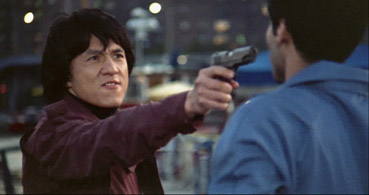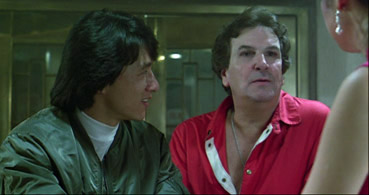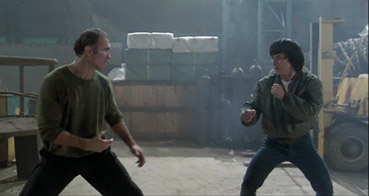|
Five
years after Jackie Chan's abortive attempt to break into
the American market with The Big Brawl
(aka Battle Creek Brawl, 1980), he starred
in The Protector, a second and equally
unsuccessful stab at exporting his considerable skills.
There are a number of possible reasons that both of these
films failed where Rumble in the Bronx
and Rush Hour later succeeded, and chief
among them is that perhaps – just perhaps – the American mainstream
audience was not yet ready to accept
an Asian leading man, even one teamed with a recognisable
American co-star. Another altogether more popular theory
suggests that it was simply because neither film was actually that good. It's been a long
time since I've seen the The Big Brawl, but on the evidence
of The Protector I'd say there might be
something in that.
This is certainly a work that has split opinion amongst
the Chan fandom. The majority vote regards it as one of Chan's weakest movies,
a colossal mistake that woefully miscasts him and fails
to properly showcase the very skills that had already made
him such a big star on home turf. The opposing, minority
opinion, represented at some length by martial arts cinema expert Andrew Staton's commentary
on this very DVD, believes that the fans have misunderstood
an important and groundbreaking early Chan film that is
ripe for re-evaluation. I find myself once again nestled oddly between
the two views. I certainly don't believe it's as bad as
many commentators have claimed, but I also don't think it's
all that good either, and in some ways a mediocre Jackie Chan
film is more dispiriting than a bad one, as you watch potentially
fine scenes repeatedly bungled and are left wondering what
might have been had Chan himself had complete control of
the project.

The
can be no argument that The Protector prefigures
the commercially successful of Rush Hour in
its East-meets-West buddy cop casting, its dual-nationality
setting, and its kidnapped girl plot. The reversal here is that
Chan's character, Billy Wong, is a New York Cop of several
years standing, one whose knowledge of his home city of Hong
Kong makes him the perfect choice to send in pursuit of
kidnappers who have fled there. Already in trouble for wrecking
two boats and executing the man who killed his partner,
he takes with him old friend and colleague Danny Garoni
(the always enjoyable Danny Aiello), and the two are ordered
on arrival to behave themselves while on Hong Kong turf.
Naturally, they don't. Acting on a tip, they almost get knifed whilst checking out a massage
parlour, then are attacked by the
same gang when meeting a contact whom Wong believes will
be able to help them. When the contact is murdered, his
daughter Soo Ling and their American friend Stan reluctantly
agree to help the pair locate the kidnapped girl.
All
of which is well and good – the plot may be by the numbers,
but with action cinema allowances are usually made as long
as the film delivers on its set-pieces. The problem is The Protector never
really does. On the commentary track, Andrew Staton argues that one of the strengths
of the film is that it represents a diversion from Chan's
normal comic acrobatics and furious combat, and this is
fair enough. But if you're going to cast Chan in a film
that includes action sequences, then you'd better
make damned sure they're up to his usual standard, otherwise
why hire him at all? If your intent is to showcase his talents
to a new market, then showcase them at their best, dammit,
and this is what director James Glickenhaus (best known
for his 1980 revenge exploitation flick The Exterminator)
almost completely fails to do. The fights are a long time
coming, are over in a flash, and they never come close to Chan's
Hong Kong work (Chan himself was not allowed to choreograph
the action sequences, and it shows). The chases are striking
for their stodgy pacing and the absence of any real excitement
– one lazily shot and edited sequence that has Chan pursuing
the bad guy through a harbour plays like a run-through
for the real thing, with Chan casually trotting rather than
running, pausing to check the safety of stunts, and three
big leaps (one on a motorbike, one on a bamboo pole, and
one off of an improvised springboard) are captured in ultra
wide shot and the slowest of motion, rendering them dramatically
sterile. A final fight on a platform being dangled from
a crane is similarly ineffective, with too many wide shots,
too much box-throwing, and never a sense that the height
and location represent any sort of danger for the characters
or performers.

Glimpses
are provided of Chan the action superstar and charismatic
actor, but their brevity leaves you aching for more and
wondering if Glickenhaus and company really understood what
they had at their disposal. Brief moments are nonetheless
memorable: Chan's sudden shooting of the would-be robber
(wrestling star Big John Stud, whose name suggests a career in porn awaits) in a bar toilet, a neat move
that flips a gun into the air and into his hand in the blink
of an eye; some nifty fist and foot work following the massage
parlour ambush; a hauntingly prophetic tilt down from the
Twin Towers to a police funeral. But it's not enough. The
dialogue is weak, the music annoying, nudity is thrown in
for cheap titillation, and any motorised vehicle that comes
into sudden contact with another object instantly explodes.
Dramatically, the film just doesn't engage as it should,
despite the best efforts of Chan and Aiello. Take a step
back from the presence of its star, and The Protector
plays like any other pedestrian and largely forgettable
1980s police actioner, something that was reflected in its
complete failure to establish Chan as a viable US box-office
draw.
Chan
himself apparently did not get on with director Glickenhaus
and had issues with some of the movie's content (swearing,
gratuitous nudity), and negotiated a deal to shoot extra
footage and recut the film for a Hong Kong audience, a version
that would have been nice to see included here alongside
this US cut. There's no doubt that despite his unhappiness,
Chan took some inspiration from the project and for that
we can only be grateful – the very same year he made the
superb Police Story and showed those responsible
for The Protector just how it should be
done.
The
anamorphic 1.85:1 transfer is solid enough but hardly reference
quality. Contrast and sharpness are good, while the colour
is sometimes a few notches wide of true. There is some grain
visible throughout, but it is not intrusive. The print,
as ever with Hong Kong Legends, is virtually spotless. Once
again this has been released under the Ultrabit banner,
which since Magnificent
Bodyguards is no guarantee of premium picture
quality, and the only thing you can be certain of is that
you'll be getting precious little in the way of extra features.

The
original English stereo and an English 5.1 remix are included.
The dialogue is not as crisp as on more recent titles and
a little fluffy in places, but the surrounds are quite well
used for location atmospherics and some sound effects, which
are occasionally misdirected to the rear.
Audio
Commentary by Andrew Staton
Hong Kong Legends' new voice of martial arts cinema once
again delivers a distinctly mixed and often irritating bag,
with some interesting background information offset by the
amount of time he spends complaining about the negative
reaction to the film and arguing its merits
and influence on later works. A big fan of the film, Staton
is clearly besotted with Jackie Chan the performer, to the
point where he over-praises even the smallest thing that
Chan does (an expression, the way he moves, how fast he
gets on a table) and repeatedly gives him and the film credit
for more than they deserve, which becomes increasingly easy to shoot down as the commentary progresses.
Particularly shallow is his dismissive attitude to Parkour
co-inventor and District
13 star David Belle, whom Staton describes
almost contemptuously as "that French guy," suggesting
either a lazy lack of research on his part or a childish pretence that he cannot recall the name of someone
so insignificant in his eyes. His suggestion that the limply
executed harbour pursuit here is somehow superior to the
high octane opening chase in District 13 is frankly laughable, and his claim that "a lot of
things have been done in this movie that you will see in
other movies" completely ignores the fact that a good number here have been recycled from earlier
films that Staton either turns a blind eye to
or perhaps just hasn't seen. He complains, for example,
that the high speed climbing and leaping feats of "that
French guy" are simply copied from Chan, based on the fact that Chan
climbs and jumps in this movie. But this conveniently disregards
cinematic predecessors such as Buster Keaton, Harold Lloyd, Douglas Fairbanks,
or even Crimson Pirate-era Burt Lancaster,
to name but four. And the very same argument could easily
(and equally inaccurately) be used to paint Chan as a Bruce
Lee imitator (there's actually a moment when a black-dressed
Chan enters a drug factory through an overhead air-vent
in the manner of Lee in Enter the Dragon)
– after all, Lee was doing all this high speed punching
and kicking long before Chan made his name. The sort of
encyclopaedic information on the performers that Bey Logan
used to deliver is sorely missed here and reserved solely for Bill "Superfoot" Wallace, who has a small
role as bad guy heavy Benny Garruci and only seems to get
special attention because Staton met and worked with him.
If Hong Kong Legends are going to provide so-called 'expert'
commentaries rather than filmmaker ones, then at least get
someone who's going to give us the facts rather than shower
us with one-sided and poorly argued opinion.
The
usual promotional trailers are
also included.
One,
perhaps, for the Chan fans only, and a fair few are them
are going to have problems here, but if you are a follower
of the young master's work and are back-tracking to those
earlier films then you should certainly give it a look,
although this is definitely a try-before-you-buy recommendation.
The disc itself unfortunately provides further ammo for
those who are cynical about the Ultrabit label – there's
nothing wrong with the picture, it's just that there are
a fair few mid-80s titles out there that equal or better
it, despite having shaved the bit rate to add some extra
features.
|